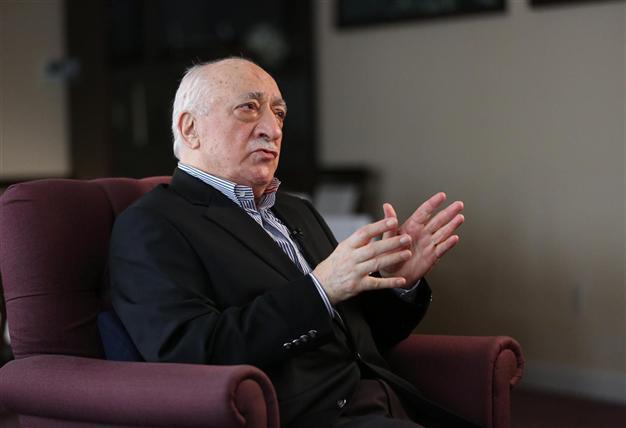Islamic scholar Fethullah Gülen gives first TV interview in 16 years
ISTANBUL

Pennsylvania-based Fethullah Gülen had not given a single broadcast interview since arriving in the U.S. in the late 1990s. Cihan photo
Islamic scholar Fethullah Gülen, whose movement is currently at odds with Turkish Prime Minister Recep Tayyip Erdoğan over the ongoing corruption probe, has given his in his first broadcast interview in 16 years to BBC Turkish.
Pennsylvania-based Gülen has not given a single broadcast interview since arriving in the U.S. in the late 1990s.
Responding to widespread assumptions that he ordered his followers in senior positions in the police and judiciary to launch the investigations into alleged high-level government corruption, the 74-year-old issued strong denials of such claims.
Gülen said the reactions of the ruling Justice and Development Party (AKP), which have included the sacking a number of police commissioners and the arrest of some of Erdoğan’s allies, were “anti-democratic.” He added that some of the demoted, sacked or reassigned members of the police and judiciary “were not linked to us,” rejecting the claims that his movement had orchestrated the probes and arrests.
“These moves were made to make our movement appear bigger than it already is and to frighten people about this non-existent phantom threat,” said Gülen.
He stressed that the bribery and corruption claims against the government were “real.”
“It is certain that there is a corruption. Everyone accepts that. The public, the elite, intellectuals, everyone sees the reality here. No one can change that,” said Gülen.
Erdoğan has repeatedly accused the Gülen Movement of orchestrating the probes in an attempt to topple his government. He has denounced the existence of a “parallel state,” referring to Gülen’s followers, who are known to hold key positions inside the police and the judiciary, allegedly taking decisions upon the movement’s orders.
The government has responded to the graft scandal with a massive purge of the police, and with the preparation of a judicial bill that has drawn controversy for increasing the executive’s control over the judiciary.
“It is not possible for these judges and prosecutors to receive orders from me. I have no relation with them. I don’t know even 0.1 percent of them,” Gülen told the BBC.
Corruption and bribery no longer a crime in Turkey: Gülen“People in the judiciary and the police carried out investigations and launched this case, as their duties normally require. Apparently they weren’t informed of the fact that corruption and bribery have ceased to be criminal acts in Turkey,” he added, with sarcasm.
Gülen also claimed that the government had underlined the existence of a “parallel state” within the state in order to cover up the corruption and bribery allegations. “Only the parallel state is emphasized. Those bribes, illegal tenders are not discussed and are attempted to be represented as ordinary things,” he said.
Speaking about the process started by the government to find a peaceful solution to the Kurdish problem, Gülen said he had never been against holding negotiations with the outlawed Kurdistan Workers’ Party (PKK).
“There can be negotiations with the organization [PKK]. But the state’s honor should be protected,” he said.
According to Gülen, imprisoned PKK leader Abdullah Öcalan was “uneasy with what we are doing with the Kurdish people” through the extension of his movement’s schools in the eastern part of the country, which is largely populated by Kurds.
“They didn’t want our activities to prevent young people joining the militants in the mountains. Their politics is to keep enmity between Kurdish and Turkish people,” Gülen said, adding that the establishment of schools and investment in the region was wrongly regarded “as if it was against the peace process.”
He was elusive about whether he would vote for the AKP in the upcoming local elections, or for Erdoğan in the presidential elections, stressing that he had not decided to make any statement about the elections yet.
“If I were to say anything to people, I may say that people should vote for those who are respectful to democracy, the rule of law, and who get on well with people. Telling or encouraging people to vote for a party would be an insult to peoples’ intellect. Everybody very clearly sees what is going on … I haven’t even decided to say anything to that effect,” Gülen said.
Asked about the heightening of tensions between Turkey and Israel in recent years, Gülen suggested the government had made mistakes. “They try to portray us as a pro-Israeli movement, in the sense that we have a higher regard for them than our nation. We are accepting them as a people, as part of the people of the world,” he said.
The Islamic scholar also indicated that his movement’s support for the controversial building of an Alevi worship place (Cemevi) alongside a mosque in Ankara, may have been a mistake. “We believed that this would be for the unity with our Alevi brothers in Turkey. We might be wrong about that. But many people approved of it,” he said.
